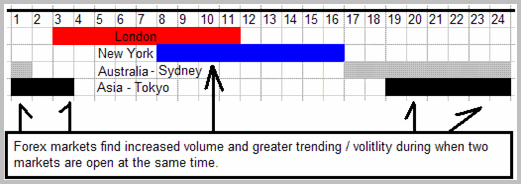The Best Times to Trade the 24-hour Forex Market
Forex traders never sleep, or at least, it would appear that way, with
markets open 24/7. With the aforementioned in mind, some may be wondering if
there’s another way to approach trading, or if there are simply “better” times
to trade than others.
Within this article, we not only examine Forex hours and when the best times
to trade are, but we will also examine the overall ‘paradigm’ behind trader’s
mindset of market-hours on the whole.
Click here to order your copy of The VXX Trend Following Strategy today and be one of the very first traders to utilize these unique strategies. This guidebook will make you a better, more powerful trader.
I Mean Really, Who Are You?
First and foremost, before we jump into a discussion of Forex hours, it’s
important to know what type of a trader you are…Doing so will help clarify the
time frames you trade. Really, there are three types of traders out there: Forex
day traders, swing traders and long-term holders. Have you decided this yet?
If you haven’t taken a clear stance of what type of trader you are, it may be
causing you to lost money…Here’s why: Without knowing what timeframes you
trade, without having made this decision in your mind, it may be causing
emotional turmoil, unnecessary trading — and even prompting you to trade at the
wrong times.
Long-term (there are very few in Forex) will most likely not be concerned
about market hours, as their positions generally attempt to transcend short-term
volatility.
Swing won’t be as concerned with short-term volatility, but for those who are
attempting to hold for one, or more weeks, can perhaps use times when more than
one market is open, for greater volatility entering, or exiting trades.
Day traders, should be most concerned about market hours. As we move through
the next sections of the article, day traders will want to remember two things:
Liquidity provides opportunity. Brokerages want to you to trade more. (I’ll
explain more on this in a moment.)
Hours of Operation
Personally, I think it’s pretty cool that Forex markets are open 24/7, the
perfect scenario for those who are trying outside of normal business hours, or
live in a distant time zone. However, not all markets are open at the same
time — they do overlap though, The below graph shows when the four markets:
London, New York, Sydney and Tokyo are open (on a 24 hour clock, based on
Eastern Standard Time)

What you will notice in the above chart is there are three times when markets
over lap…
3:00 AM to 4:00 AM – London and Tokyo overlap.
8:00 AM to 12:00 PM – London and New York are both open.
7:00 PM to 2:00 AM – Sydney and Tokyo trade together.
During times when more than one market is open, volume and volatility
increase significantly, and are a great time for day traders to see action
happen. However, when only market is open, trading can dry up significantly,
especially late at night, via U.S. time.
There are two points to note here though:
1. While trading action can be slow when only one market is open, it does not
mean that movement does not occur. Many brokerage firms will tell you that it is
not a good idea to trade (for daytraders) during times when only one market is
open. And, it’s understandable too, since they make their money when you trade
heavily. When only one market is open, there’s a good chance you’re going to
trade less. Thus, remember that while Forex firms would prefer you only trade
during hours where more than one market is open, you can still make money when
only one market is trading.
2. When the New York markets is open, by itself, during the day, traders will
generally see more action than when Sydney, or Tokyo are open by themselves.
Usually, London can be fairly slow too, from 4:00 AM until about 7:00 AM, but
can see an uptick in volume even before New York opens, as U.S. traders wake up
and login, pre-stock market. Though the New York market is open by itself from
noon to 7:00 PM, noon to 5:00 PM can see movement, as many U.S. stock, option
and commodity markets are open too.
At the end of the day, Forex daytraders will likely want to be around mostly
for hours when more than one market is open; however, only having one market
open doesn’t mean that currencies won’t move — especially in the case of New York
hours.
Finally, by trading in currency pairs that are related to the markets open,
there could be increased volatility, as opposed to the currency pairs that are
not. However, we are a globally connected currency market and if one market
makes a bold move, do not, for one second think other markets will not move too.
Because of the rise in Forex popularity, every market is connected like
water…When a stone is cast in one market, the ripples will move through all
markets.
Mark Whistler is the founder of
WallStreetRockStar.com and is the
author of multiple books on trading.
Mark’s newest book, The Swing Trader’s Bible (John Wiley & Sons, Inc.) –
co-authored with CNBC/Fox News regular guest Matt McCall – will be on shelves in
late summer, 2008.
In addition, Mark also writes regularly for TraderDaily.com and Investopedia.com.
Click here to sign up for a free, online presentation by Larry Connors, CEO and founder of TradingMarkets, as he introduces The Machine, the first and only financial software that allows traders and investors to design and build quantified portfolios.
